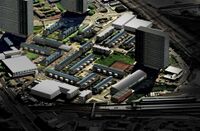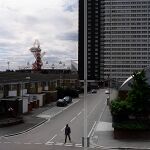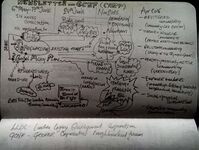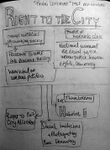LED 2016 Group C Landscape Democracy Challenge 3: Difference between revisions
No edit summary |
|||
| Line 32: | Line 32: | ||
== Representation of your observations == | == Representation of your observations == | ||
* ''you are | * '' | ||
The Interview: | |||
An email sent to 110 residents of Carpenters Estate stated the matter in which they would be addressed for the purposes of getting the full story in perspective. One person responded, it was the ex-chair of the tenants association, a contact which I found in my inbox from our previous correspondence back in 2012. | |||
I have now been looking into the Global movement of the Right to the City and reading various articles which relate to the movement, to find on ground level a warm-hearted relation to the notion of social movement emerging through the cities around the world which challenges the quality of urban life in broader context. A movement for local residents and businesses whom have gather to protect the community assets and challenge the means of public land and further use of existing urban fabric. | |||
The Estate was build 1968 and Tenants Management was established in 1997. 2004, announcement for demolishing one of the towers James Riley Point and decantation of tenants. In 2005, London wins the bid for the Olympic, and between 2005-09 Three Masterplan including to increase density of the site from 75 units per ha to 220 units per ha. In 2010 stakeholder workshops and public meetings organised by the Newham Council. | |||
The GCNF story is slightly different starting with Management of the properties, to the right to buy the council flats, to organising the local tenants against demolition through to protecting the local community assets, and forming a Neighbourhood Forum, which is complying with the London and Local Plan and the Planning and Community Policies. The local authorities have not shown any interest in working together with the community of the estate. | |||
The phone rang five minutes after I sent the email to the CARP residents group (Carpenters Against Regeneration Plan) which caught me off guard to start a conversation; would I ask the right questions? | |||
Initially, the voice on the phone said: Well, a lot happened since 2012, and as you remember we worked with Just Space and LTF(London Tenants Forum) and still working with them now, but we are no longer called CARP, but Greater Carpenters Neighbourhood Forum; and I am not involved as much these days, I still go to the meetings but other people have taken over the role of the plan, which we are currently working with residents so it complies with the London Plan, The Olympic Legacy and working with London Legacy Development Corporation (LLDC) as the local planning authority and suspiciously adds ‘apparently the policies of our activities are already in our Local Plan.’ | |||
I ask: ‘What does it mean?’; he says ‘I guess we have won’; I say: ‘Won against Who?’ He said: ‘Well the developer has run out of money and they could not even finish the projects they started (a French company) and now they could not demolish the buildings, so we are now allowed to start a community-led plan to refurbish the towers and the lower-rise,’ | |||
Q: ‘Are you trying to get the Neighbourhood Plan together to protect public assets and remain as a social housing from becoming extinct and relating the global movement of The Right to the City?’ | |||
A: We are not trying to save the world, we are keeping it low, focus on the immediate area. We are not challenging any politics actually none of us are interested in that side. | |||
Q: Are the local authorities working together with you? | |||
A: They are not working with us, but they are the owner of the land. Well actually they are not the freeholder, they are Custodian, which means they should also follow policies, housing laws and have to justify their intentions; and they do not have the right to undermine human or legal rights of the local residents. | |||
Q: Are you trying to protect the Social Housing? | |||
A: Well, we compromise, as there is not enough motif. It should fall under affordable housing and the council's ability to offload social housing. | |||
Q: Are the buildings fully occupied? | |||
A: The low rise is fully occupied, the block are there, they are just stagnant. | |||
Q: What is the plan? | |||
A: The plan is to keep it as it is and refurbish the blocks and add few floors to the low rise, but most of the people living in our neighbourhood do not want to be involved, they do not even like talking about it, they are ignorant, they refuse to get connected, and the system capitalises on it. | |||
'' | |||
<gallery caption=" " widths="200px" heights="150px" perrow="4"> | <gallery caption=" " widths="200px" heights="150px" perrow="4"> | ||
Revision as of 13:31, 12 May 2016
Carpenter's Estate, Olympic Site, Stratford, London, Hidden Challenges
| Place name | Carpenters Estate | |
| Location | London, E15 | |
| Country | UK | |
| Author(s) | Daniela Ellis | |
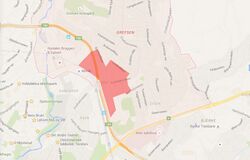
| ||
Rationale: Why have you chosen this case for the landscape and democracy seminar?
- Why is this case relevant?
- ‘Everything we see hides another thing, we always want to see what is hidden by what we see.’- Rene Magritte
This is not about Residents against Demolition or anti-development movement to prevent progress, but a meaningful conversation about the impact of political decisions and the impact of privatising public land also known as change of ownership. A well located Carpenters Estate is adjacent to the Olympic development site, Stratford International Rail Station, and Stratford City Westfield Shopping District. This story is about the offloading public assets, shifting wealth, and the links of this movement the global movement of the Right to the City. In conversation with the Local Tenants Association, called CARP in 2012, now known as Greater Carpenters Neighbourhood Forum, there are hidden notions of oppression and intimidation which manifests well through the phone interview with the ex-chair of the tenant association.
Representation of your observations
The Interview: An email sent to 110 residents of Carpenters Estate stated the matter in which they would be addressed for the purposes of getting the full story in perspective. One person responded, it was the ex-chair of the tenants association, a contact which I found in my inbox from our previous correspondence back in 2012. I have now been looking into the Global movement of the Right to the City and reading various articles which relate to the movement, to find on ground level a warm-hearted relation to the notion of social movement emerging through the cities around the world which challenges the quality of urban life in broader context. A movement for local residents and businesses whom have gather to protect the community assets and challenge the means of public land and further use of existing urban fabric. The Estate was build 1968 and Tenants Management was established in 1997. 2004, announcement for demolishing one of the towers James Riley Point and decantation of tenants. In 2005, London wins the bid for the Olympic, and between 2005-09 Three Masterplan including to increase density of the site from 75 units per ha to 220 units per ha. In 2010 stakeholder workshops and public meetings organised by the Newham Council. The GCNF story is slightly different starting with Management of the properties, to the right to buy the council flats, to organising the local tenants against demolition through to protecting the local community assets, and forming a Neighbourhood Forum, which is complying with the London and Local Plan and the Planning and Community Policies. The local authorities have not shown any interest in working together with the community of the estate. The phone rang five minutes after I sent the email to the CARP residents group (Carpenters Against Regeneration Plan) which caught me off guard to start a conversation; would I ask the right questions? Initially, the voice on the phone said: Well, a lot happened since 2012, and as you remember we worked with Just Space and LTF(London Tenants Forum) and still working with them now, but we are no longer called CARP, but Greater Carpenters Neighbourhood Forum; and I am not involved as much these days, I still go to the meetings but other people have taken over the role of the plan, which we are currently working with residents so it complies with the London Plan, The Olympic Legacy and working with London Legacy Development Corporation (LLDC) as the local planning authority and suspiciously adds ‘apparently the policies of our activities are already in our Local Plan.’ I ask: ‘What does it mean?’; he says ‘I guess we have won’; I say: ‘Won against Who?’ He said: ‘Well the developer has run out of money and they could not even finish the projects they started (a French company) and now they could not demolish the buildings, so we are now allowed to start a community-led plan to refurbish the towers and the lower-rise,’ Q: ‘Are you trying to get the Neighbourhood Plan together to protect public assets and remain as a social housing from becoming extinct and relating the global movement of The Right to the City?’ A: We are not trying to save the world, we are keeping it low, focus on the immediate area. We are not challenging any politics actually none of us are interested in that side. Q: Are the local authorities working together with you? A: They are not working with us, but they are the owner of the land. Well actually they are not the freeholder, they are Custodian, which means they should also follow policies, housing laws and have to justify their intentions; and they do not have the right to undermine human or legal rights of the local residents. Q: Are you trying to protect the Social Housing? A: Well, we compromise, as there is not enough motif. It should fall under affordable housing and the council's ability to offload social housing. Q: Are the buildings fully occupied? A: The low rise is fully occupied, the block are there, they are just stagnant. Q: What is the plan? A: The plan is to keep it as it is and refurbish the blocks and add few floors to the low rise, but most of the people living in our neighbourhood do not want to be involved, they do not even like talking about it, they are ignorant, they refuse to get connected, and the system capitalises on it.
Reflection
What are the major challenges for changing the situation?
- Please add approx. 150 words in essay style
What could be a starting point for democractically-based change?
- Please add approx. 150 words in essay style
References
- http://greater-carpenters.co.uk/
- carp-newsletter-1
- carp-newsletter-2
- https://www.bartlett.ucl.ac.uk/dpu/programmes/postgraduate/msc-social-development-practice/in-practice/london-based-fieldwork/carpentersreport
- https://www.youtube.com/watch?v=vjyLWMSZ2nY
- http://www.mckinsey.com/global-themes/urbanization/urban-world-mapping-the-economic-power-of-cities
- http://www.uclg-cisdp.org/en/right-to-the-city/world-charter-agenda
- https://en.wikipedia.org/wiki/United_Cities_and_Local_Governments
- http://www.theguardian.com/cities/2016/apr/19/right-city-social-movement-transforming-urban-space
- https://www.habitat3.org/the-new-urban-agenda
- http://homesforall.org/about/
- http://www.theguardian.com/world/2013/mar/04/corrala-movement-occupying-spain
- https://www.newham.gov.uk/Pages/ServiceChild/The-Carpenters-Estate-Stratford.aspx
- HowtoHousingCo-op6theditionJuly2011low-res
- A nomadic war machine in the metropolis
- Habitat_III_National_Reporting_Processes_-1
- UCLG_Global_Charter_Agenda_HR_City_0
- Please make sure that you give proper references of all external resources used.
- Do not use any images of which you do not hold the copyright.
- Please add internet links to other resources if necessary.
About categories: You can add more categories with this tag: "", add your categories

